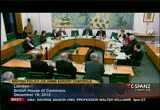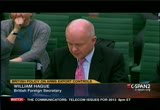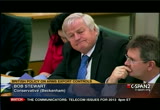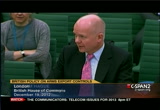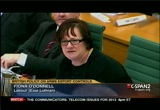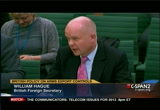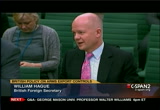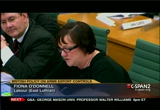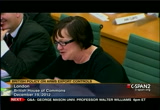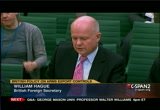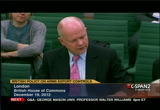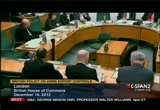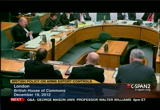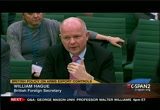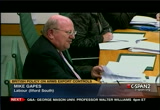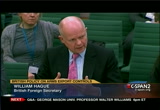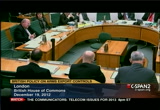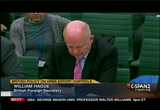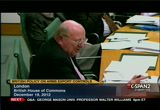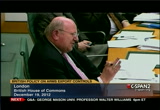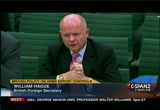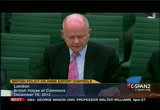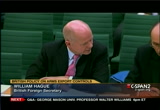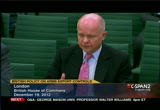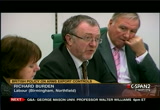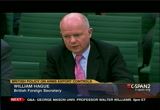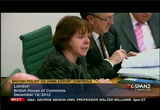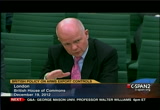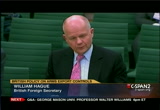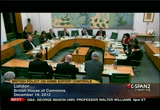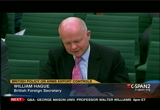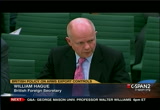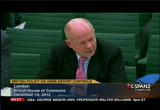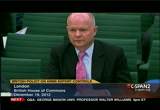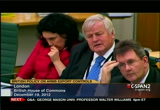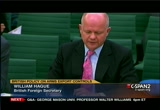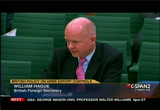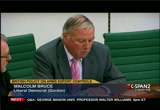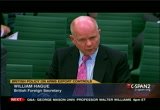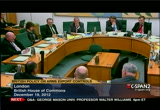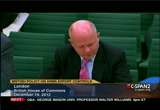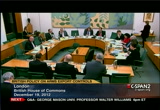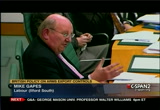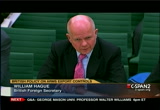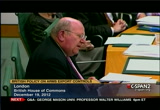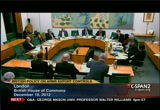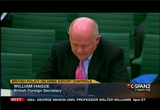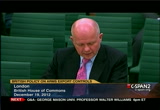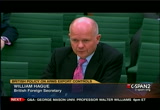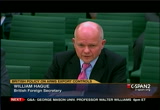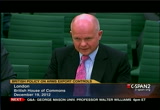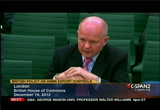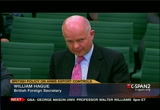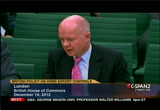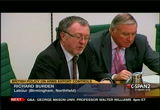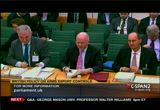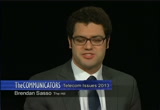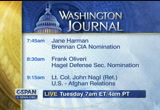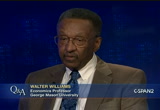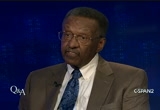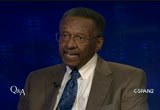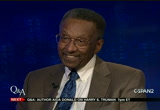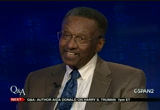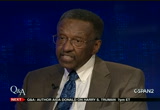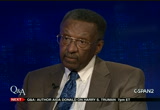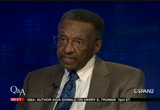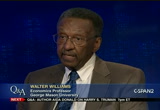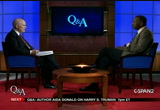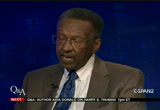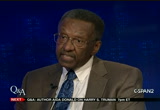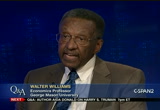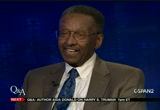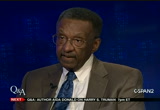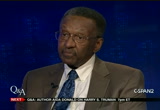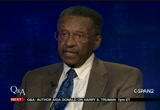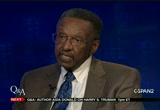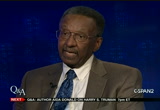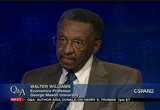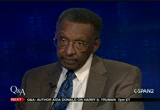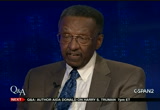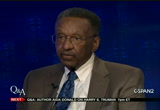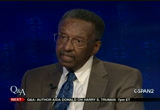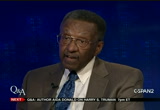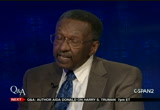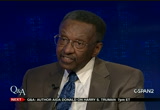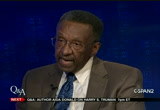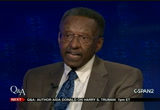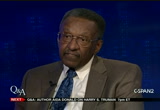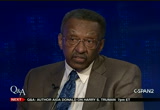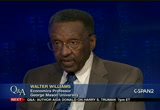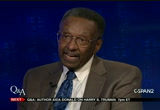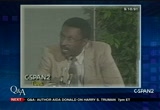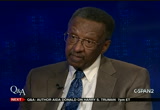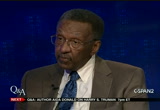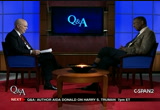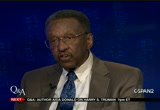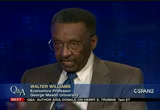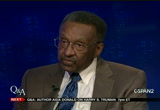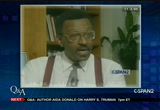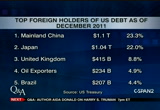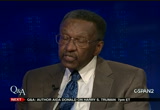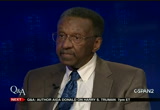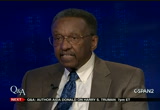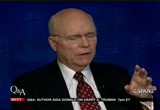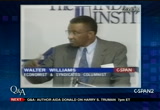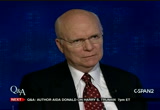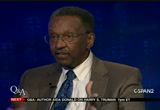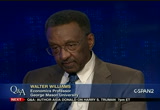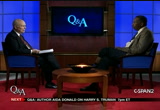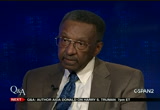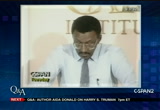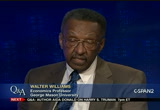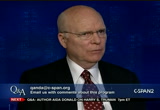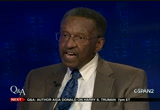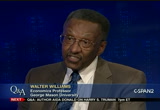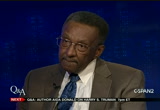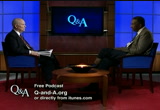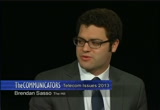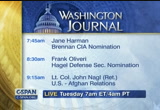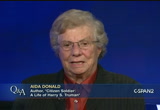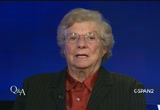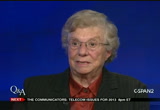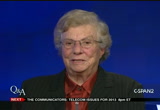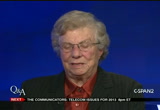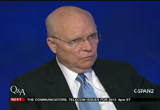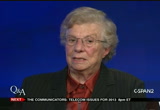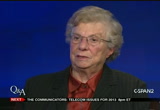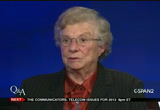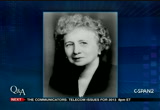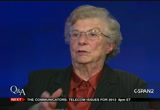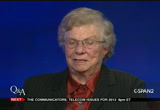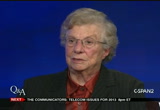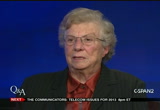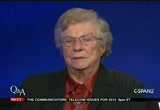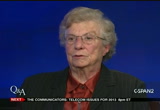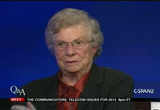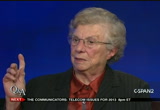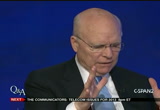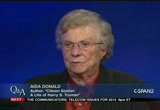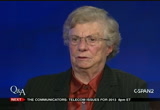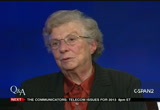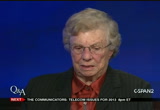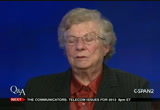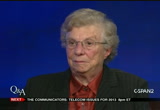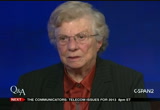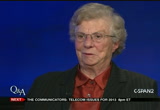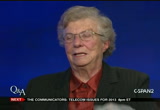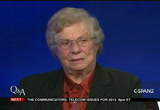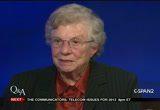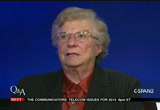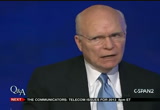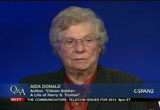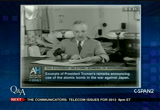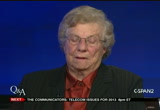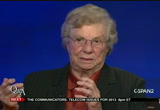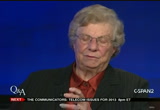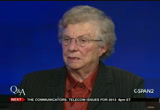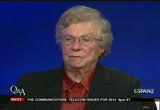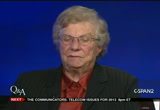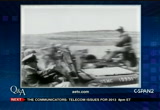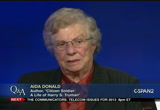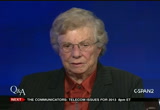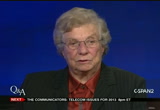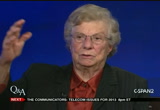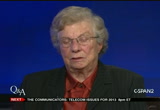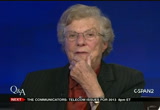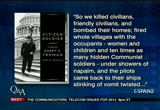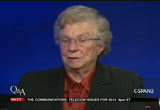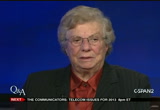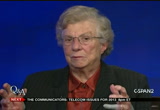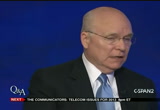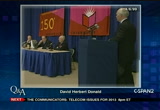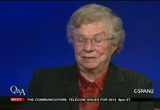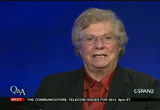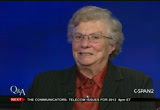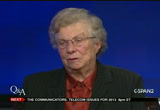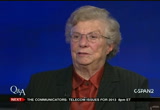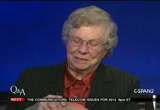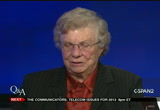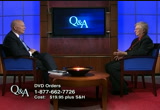tv U.S. Senate CSPAN January 7, 2013 5:00pm-8:00pm EST
5:00 pm
submitted to fco minister ors. as this impacted on the time of the process to be completed, and if so, what has been the effect on -- [inaudible] >> um, i don't think it's add any significant effect on the -- we're doing well on time. we received 15,000 applications in the last year, 85% were completed in ten working days, and 99.8% within 60 working days in the foreign office. ..
5:01 pm
5:02 pm
5:03 pm
report from their concerns and i hope they include more information to this. >> they have an objective here in the proposal but we have made >> i would like to start with a couple questions. you keep saying the communities of history -- the so-called cover and interest might mention [inaudible] >> we saw this on the telegram and this provides the framework for the current and future
5:04 pm
defense activity including framing and capacity building with bahrain and that is to enhance the stability of the whole region as the committee will be aware we have to send to our own state and our minesweepers her and in particular which are responsible they failed if and face an agenda on arrangements. we have a long history of engagement since the independence of bahrain since 1971. so this of course complemented. it doesn't change the expert in any way. and indeed there have been
5:05 pm
applications in relation deutsch bas-rhin so it doesn't change our report to licensing. they have difficulties and it is an ally of the kingdom. >> it's not -- the relationship includes training and capacity building. it's often argued by those in authority and what they need in the security forces to know what to do and about crème's defense force since the beginning of the
5:06 pm
trouble of bahrain in 2011 and it's not been deployed at all in the last year. so it doesn't relate to this too [inaudible] >> the minister defends allies there is no problem. it's not a secret. >> [inaudible] >> exactly. some of these announcements are to bring in and if you could share that with us.
5:07 pm
>> we follow that in 2009 in saudi arabia and the tribes. equipment was used in the criteria and the defense with saudi arabia includes the personnel. our training, military training establishment which includes the national humanitarian role, human rights and accountability. so, we know tv to have no reason to believe our criteria was breached in the situation. >> a general question on the committee has a general question on the transcript --
5:08 pm
>> we did have as the committee knows we had a ratification of 158 licenses last year. does the committee prepare a different view on the lessons of that so i suppose the more detailed answer would be i don't know if you mean by a more authoritarian regime. they are easily in the middle east and it is a couple in the last year in the embargo changed, so i think those are examples.
5:09 pm
>> can they have some kind of defense operation that doesn't have the same status that we are talking about in the controls from the arms exports in the transfer equipment that wouldn't be over subjected in the criteria. >> bright futures. >> those are subject to more and more security policy in that all
5:10 pm
5:11 pm
[inaudible] is that correct? >> there's an opportunity for many different to comment. i think it has yet to focus on this work establishing at. but of course there are recommendations with the embassy in the country, from the human rights to prevent, so the ministers are given the view that we want to know that this agreement from different parts. a speck in a previous session you said this was taken for consideration in the decision. is there still involvement
5:12 pm
affecting the decisions? >> they are not delaying them beyond any time. >> [inaudible] hundreds of billions invested. >> i'm sure that we were certainly expeditious and i want to say in particular it's a difficult decision on an arms export license and will think about it from a couple of days but the officials are very efficient and we've dealt with
5:13 pm
99 and 66 working days. a year ago they delivered a table long outstanding places where this has been over a year and now we are not outstanding over a year. at that time we had between three and six months and now we have only 15. so you can see the actual numbers of those that are taking three months are very, very small. >> they are involved in syria this applies not just to the regime but also to support opposition groups and what would be necessary or what would be the process if as the prime
5:14 pm
minister said on monday there was a change looking at the views what would be required in the u.k. government or any other individual state to supply military equipment to elements within the opposition? >> so first is called pool of syria other than to any equipment needed to the opposition groups and we had just rolled over that embargo on december 1st but we decided to the negotiations in the united kingdom to do that for three months rather than for 12 months and we decided to do that because we don't know how the situation is going to develop
5:15 pm
and we think we should be given flexibility to respond. we haven't yet taken any position beyond that. the process, therefore to the efforts of your question, it is now the e.u. state that is coming up to the first of march deadline of the current e.u. whether they will want to amend that in any way. it could be amended to apply to the regime and not to the opposition forces but it could be amended in many other ways. as a that would require the agreement of all of the states.
5:16 pm
>> in the syrian opposition i'm interested to know if that could be linked but not lethal. how serious is this embargo and is it possible for example the communications equipment that could be used in conjunction with turkey and some other countries to the elements in your possession. >> well, it's not military. it's certainly not legal. the systems so far include some things like the deployment on the stabilization defense to work with the opposition on the future plans and how they are getting help for people's basic needs and oppositions and training the citizens. we are providing each other actable material in the kits and generators to help civilians in opposition the communications
5:17 pm
equipment to help activists overcome the communications, blackouts, blockages produced by the regime and together now, as i have said on the floor of the house the balance for the need to do that people are in desperate need and are given the genuine help to fund these things against any risk that could be used very heavily on the size of delivering that beyond those things. >> your country was supplying weaponry. do other countries have the same strict view on this supply or
5:18 pm
not supplied? >> i believe so. i have no evidence to the country. >> do you think -- >> we are doing this if the country is going to breach the e.u. there wouldn't be an illegal act in the country did that and i have absolutely no indication from -- an important question. if it was decided because the
5:19 pm
situation in syria is ending a rapidly and it did come to a tipping point perhaps over the christmas recess how would that be changed, with that require a meeting. [inaudible] >> that can be done technically, and it could be done without any council that would require unanimity and all of the states agree on that and as there are a variety of reasons about the situation in the european union and what to do next. so i think that is unlikely to change in the coming weeks but it's not impossible.
5:20 pm
5:21 pm
in this pacific understandable reason the prime minister does raise the treaty to say that. >> what would you say belongs to the organization's on the corporate level? >> there are no specific ends in a few moments ago they are holding the conference in march and the specific attitudes of the golden state haven't been among the most treasured countries on the state. >> i think there is a genetic concern for countries in the middle east to entreat people.
5:22 pm
we apparently implement and since we currently are able to export and why since the treaty wouldn't add anything on top of that so it should be not made more difficult. >> can you perhaps indicate what level on the treaty? >> it's very enthusiastic about the world that we have and the ministers involved in to get to where we got in july's treaty
5:23 pm
pushing for the conference that we have in march, and we need to call in the phone calls and the prime minister at this time in the negotiations in the final traits and he would be very responsive and raised internationally going back to the views what you were saying based on your answers in saudi arabia and yemen the implementation of that to respond decisively. if that is the case as it has
5:24 pm
been expressed i think it's been diluted to that wasn't sufficiently involved not just in the review but in the implementation phase of that review which they said they were consultation. what has been done to implement it and -- >> they are all in favor of the maximum communication so we can do that. we can organize a meeting to do that. we have in the human rights identity group wideranging groups with many keys represented in the approach to the arms trade treaties in march
5:25 pm
they are very responsive and supportive of that speech to i think that represents the reviewed procedures that we have so i would happily point my officials to another meeting to decide. >> we will turn now. >> secretary of state the institution is the need to conduct. can you give an institution of whether they try for such a
5:26 pm
card? >> a lot of our banks have issues to a statement about. hsbc have issued statements and they wouldn't knowingly invest with the producers and they have a voluntary approach, no question, voluntary approach on the intervention to the government, so we will now monitor the institution and the state and i would encourage them also to spell out positions clearly. that will deal with the issues. i wouldn't rule anything out if we don't get that if.
5:27 pm
>> they are consistent upon the practice that surely gives that interest the court to the practice in the financial institutions and publicly adopted conduct proactively. >> well we are monitoring closely which ones do this and which ones don't. but i'm happy to see now there isn't much progress on this and there are institutions are now the world making their approach clear that we will have to ratchet up the reminders with great interest so i'm not ruling anything out but i would like them to do this themselves.
5:28 pm
it's the easiest way for it to be done. so why don't rule them out and when i come back to the committee we will see a lot more of the institutions deutsch and we will be looking for options. >> we have had a request for advice and we have provided them >> than the relationships and consistency between the criteria for the arms exports and the common position by date. islamic your opinion in council was announced on the first part of the review on the position. is the government satisfied with this and what do we expect comes
5:29 pm
from the final conclusion of this? >> it's the initial findings that are important in the conclusions adopted in ten days or so ago. the member state concluded the position is working well on the implementation so we have the results of that worked. it is the way the work is being conducted and the outcome or particularly the adoption of the arms race treaty in the meantime many of them affect the end of the e.u..
5:30 pm
>> to have known is whether it is satisfactory or not. is it the case as it has been put to rest on the working group that stakeholders should have been involved in this process and in addition there should be more openness and transparency. >> there should be more openness in the affairs and this process is being conducted by the action service. it's for them to decide. they have had a meeting with civil society and in brussels on the fourth of december including a review of the common position and i don't have the list of who attended the that but it's an opportunity for the ngos to attend to that.
5:31 pm
i can say that i would encourage them to do more of that. that's a beginning in the openness. >> it seems their own criteria are weekend in some aspects in the common position. do you agree that is the case? >> if so the legislation on the national positions. >> when the export licensing decisions there are some of our consolidated criteria in the minor prospectus the national
5:32 pm
security assessment and the defense interest were considerably week. >> i would like to see any substantiated arguments but that wouldn't be our view at the moment so let's have the details of that. >> there is one thing in our criteria that seems to be grounded that would otherwise be produced on the common position. >> by all means, do follow the understanding of what how we do these things. >> let's turn now to a particular aspect that has made your department committee of licenses to deal with the
5:33 pm
maritime. >> some of the licenses are approved to some countries include night vision devices, pistols etc to make a good army out of that i reckon in my experience. how sure are you that these are not being exported specifically for maritime security might not be diverted and russia is also in the country but a traditional exporter of such equipment to other countries as well. >> it's obviously very important to fight piracy effectively and we are doing that as a result of
5:34 pm
the range of measures. but part of that is proper protection deterrence. that is resulting in an increasing number of the applications, these sort of things, body armor and other maritime security, the two things to say it is assessed on a case by case basis against the criteria taking into account the decimation and the risk of diversion and destinations to raise concerns against so we don't have to look at those criteria. second, subject to that the improved license of the company signed up to the international code of conduct. >> they are of course of reading of somalia.
5:35 pm
>> the company is using special forces personnel on the ship of the horn of africa would be subject to the control. schenectady are attached and include operations limited to the state, equipment used by demint personnel and the company must provide a copy of the standard operating with each application with the limit on the weapons that can be held in any one country at a time so they can form an army out of that and weapons must be secured securely if the country's national security organization or an authorized al-marri. >> you've taken my supplementary. thank you, chairman. [laughter]
5:36 pm
>> we will turn now to ann jones and the missile control technology. >> thank you. secretary, akaka international development committee was in pakistan a couple weeks ago and we heard for ourselves the political impact of the drones and the weightier being exploited women not to the election on some of the sites so i wonder if you could give some reaction to the argument that is being put forward by some of the suppliers that they are worried when the control regime is damaging the market and i knew
5:37 pm
what the policy was in relation to the german activity to the extent you feel the system we have is adequate to control the supply components. >> dhaka controls are on the export can't those capable of traveling in the payload with 500 kilograms are subject to the strong presumption of denial. we are an advocate of strong controls and partners ensure that these remain appropriately controlled. given that there are more countries interested effective
5:38 pm
and appropriate controls will remain very important and that isn't to say the technology changes but a woman can beat commander important. >> what about the development of leasing or renting out drones? because this couldn't be a way of getting around the regulations. do you think it is and the u.k. itself to those have to comply to the same regulations where if he has things coming to assume the same rules wouldn't apply? >> the same controls apply.
5:39 pm
>> were you saying or not saying that the british government will resist any attempt to weaken the regime in relation to the drones? >> what i am saying is they have to be members. >> the british government will resist? >> not in general has is clear our position in general is not to hold a position on the arms treaty export overtime, but i don't know what other people will despise but they are
5:40 pm
weakening the position we won't have a strong tough export at all times. >> [inaudible] >> of their are a vast range of issues on a regular basis and while again, i can't start listing of every confidential meeting it would be amazing if we hadn't discussed this and the last era the countries are concerned we wouldn't be giving afghanistan in this case. >> we have the time table in terms of non-members. i want to ask about that but the
5:41 pm
equipment. i understand there are about 3,000 individuals and 11,000 components and equipment with about 4 billion pounds in afghanistan with the forces. presumably a large part of that is going to have to be a sense of security. but some of it goes back and the questions are what steps are we going to take and does that come within the export controls which i have already touched on, but to guarantee do we have for the equipment for the afghan forces
5:42 pm
5:43 pm
we are also negotiating with kazakhstan and russia but we can't bring that equipment out by air. there are plans to leave equipment behind. there is no defense to leave behind that equipment act in afghanistan. if we do that. but - if it is left the state. >> would have to be issued for the need for the parliamentary proposal to be solved for any such case of equipment? >> the other opportunity and the
5:44 pm
consideration today for the committees as the very question on the licenses if you want to. >> we are going to get to the recruit on the under crown immunity. the table on the annual report on the equipment of health care and if it is above a certain value they are informed in advance. >> at this moment, we are not in the position. >> i'm sure and they will need to supply some information to that. >> we take up the export the end
5:45 pm
of this committee of the government in terms of the relation to the e.u. and our other allies to encourage them to consider each suggestion for the government to do that. it is inconsistency in the government position. >> no, i don't think so. our policy was changed and the actions in the economic interest we do have a particular interest in the united kingdom and we do expect all of the countries to take actions into account when considering export licensing applications. but they have to make assessments of that, and i think's trying to persuade them
5:46 pm
to stay in the exports and any relevant equipment there will be a larger argument in those particular benefits because i don't think other countries what regularly adopt this position. i would think that would be a productive use of our time. >> does the department have any figures for the number of exports in the process? >> they are relatively small. there are the licenses and six open licenses which covers the components for mother terrie crafts, companies in the naval
5:47 pm
vessels, software for the military communications equipment and some equipment including cryptography. the amounts were more such as in the last year, less than 2 million pounds in total. but this is principal in my investigation and others agree given the changed posture and the position that is being adopted in the 1990's to not have any export enhanced in the capability than to permit the capabilities that we shouldn't be taken in argentina's chief of military capability but they are very small. >> why have to say our defense minister following fall given
5:48 pm
circumstances where in that wall british ships were some with french missiles. i find it extraordinary that the british cabinet is not willing to let least try to persuade others to pass argentina to adopt the policy that is now being followed greatly by the british government. i find it extraordinary against the history that you shouldn't be running to exempt yourself in that way. >> you have to remember we are in a very different straight thankfully for that tragic and dramatic time in the capabilities of the times, the military in terms of our own defenses and the argentina has their own military action on the fault line. therefore all offenses on this
5:49 pm
so we don't want to contribute in any way of results from maintaining the military capabilities which are considered less in 1982 as remembered. but there are compelling reasons why they have decided to adopt a more restrictive policy towards argentina. from the sources and information available to you have i'm sure very good reasons for that policy. why should you not be persuading others? >> i don't think that what becomes of policy in other countries and we have to direct that. nor do i think we are anywhere near the moment the evidence available to a crisis which in
5:50 pm
the military sense. >> [inaudible] >> what actions if any are you taking in the region >> we constantly monitor the situation circumstances. in the recent conflict, the british embassy monitors the situation closely and affected the use of the weaponry and we called on them including in the conversations with the israeli foreign minister to abide by the financial humanitarian law and all civilian casualties.
5:51 pm
of course they were to cooperate to reach a ceasefire and you also have an answer on this for any license in the situation. >> date originated in the u.k. and used the conflict. >> we have no assessment today whether they whir of components used but we have to remember the circumstances as i have seen them describe them they've written on the floor of the
5:52 pm
house what ever we think about the situation to the situation for the conflict and the increased frequency of the facts on southern israel so that is a factor of looking at this as well. >> it is a component or equipment in the u.k. used by conflicting and gaza and its aftermath would that be sensible >> we have no evidence to date.
5:53 pm
5:54 pm
lease equipment? >> well, those are the why the questions under the licenses and the control regime, but i don't want to give any commitment today to change the rules on that. >> mr. secretary, thank you very much indeed for coming. thank you. i feel very confident that the correspondence between the committees and yourself will continue. thank you very much.
5:55 pm
>> skill mccuish of the congress failed to reach an agreement on the cybersecurity legislation in 2012 as perhaps many would have predicted. they remained a part opposed to any sort of cybersecurity standard. >> another issue will be for the spectrum so they have this rolled up in the next of some of the hot-button issues are unlicensed spectrum, the power, the other amusing devices that they are coming up with all the time. >> net neutrality could be a big issue. the d.c. circuit is considering the challenge to the fcc rules, and it's not clear exactly how the court is going to rule that there are indications on some
5:56 pm
5:57 pm
this week on q&a, george mason university economics professor and a syndicated columnist walter williams. c-span: dr. walter williams about to try some word association and get you to talk about people in your life. start with rush limbaugh. >> guest: a lot of people ask me how did rush limbaugh call me for his show and i said he was looking in the mirror and she won't take a vacation so he said who was the second-best talk-show host in the world.
5:58 pm
no, but actually what happened is bob dorning used to fill in for him and was interviewing me on the air coming in a lot of times when i am being interviewed on the air right to go for the show and a kind of liked it. and so he called me and he said would do want to host michaud? i'm going out for a couple days and i said i never host a show in my life. so he said my people will show you what to do. that was in october of 1992, and i've been doing it off and on since then. ..
5:59 pm
and how powerful is that show. i think it's the biggest talk show in the history of radio, anywhere in the world. and, you know, 20 million people a week and i think it's a very, very significant -- i think what it does talk radio in general has ended the monopoly by the major media you have different ideas coming in and challenging the conventional wisdom. i think that's powerful for the american people. >> host: bill cosby. >> guest: that's a funny one. when i was young and woe were living in a housing project in north philadelphia and she said see that boy out there he's never going get anywhere.
6:00 pm
he's silly and never going to get anywhere. she was wrong about that. >> host: how do you know him? >> guest: fairly well as a kid. i haven't seen him in years. we served on the board ever trustees on the board of temple together and that was the mid '80 and i haven't seen him yet. and some of the people he talks about on the show, fat albert, they were people in the neighbor. >> host: dr. j.? >> guest: i have only seen him once many times on television, but heist a second cousin of mine, and of course i don't play basketball as well as he does. >> host: and a second cousin you don't have a relationship with? gail: no, i found out about him after my father died he's a second cousin, and i guess one
6:01 pm
of my second aunts called and said do you know you have a famous cousin and that's how i found out we were related. >> host: what were your parents like? >> guest: my mother she was a -- my mother and father got separated and they got divorced in 1948 or 1950, and i saw little of my father growing up. my mother was a mother and father. she was a very demand and the wind of woman that even though we were poor she used to say look, we have a beer pocketbookbook and we have champagne taste. she was expecting us to dot best. i pointed her a number of times by not doing the best. she had to come to the school and talk to teachers or principals about me on a number of indications. >> host: when did you think you were going become a
6:02 pm
professor, a columnist, a public figure? >> guest: heck, which was nothing i planned. why graduated from university of california state with a b. a. i planned to work for a bank or something like that. it turned out my father's third wife, she was a member of the sorority, and they were -- her sorority they were holding an essay contest for scholarships and the essay contest it was at u.k. l.a. it was judged by professorsed at ucla i think i came in third or thowrt place. i was pointed. the dean at one of the dean said don't go away disappointed. the too wees is not that much. why don't you apply to the ucla
6:03 pm
graduate school? i applied and was accepted. i think my second or third year i got a part-time job at lang city college and teaching in the evening. i loved it so much i said it's going to be my life. as to being a column nist or a public figure that was not many any plans. >> host: how did the column start? >> guest: i wrote for the philadelphia tribune. it's a black -- one very old newspaper in philadelphia and it turned out that the president of the "philadelphia tribune" contacted me and said i want to change the newspaper i want economics. he hired me to write a column once a week and then i was discovered, as it was in 19 oil, when the heritage foundation was started a syndicated column, and they invited me to be on the
6:04 pm
syndicate, and i fell over. ed grimesly the editorial of the times and said he loved the columns but said nobody is reading it. you ought to accept the syndication. it you write a column, we will carry it. and they have been carrying my column for thirty some years. >> host: what is the story on the creator syndicate? >> guest: it represents, ever -- it was a friendly take over of the heritage features, her timing features was a syndicated and i think maybe five, six, seven years it was taken over by creators and new people. and he was the president of it and he respects writers and i enjoy working with him. >> host: another name association. malcolm x. >> guest: malcolm x.
6:05 pm
during the civil rights movement he was kind of a hero of mine. much more so than martin luther king, because i was quite of a radical as a young person, and i was the one that thought we should shall overcome is not a effective way of gaining civil rights. i think i i thought that more confrontation was needed. >> host: what made you a radical? what does it mean? >> guest: i think a radical, -- i'm still a radical today. that is i believe that a radical is any person who believes in the official liberty and individual freedom and limited government. that makes you a radical. and i have always been a -- person who believe that people should not we are interfere with me. i should be able to do my own
6:06 pm
thing as long as i don't violate the rights other people. >> host: who is the difference of following malcom x. omar tin luther king? >> host: well, at that time i thought martin luther king was too much a compriseer. i was willing to demand people in my career in the army was a part of that vision of confronting racial discrimination. >> host: how tall are you? >> guest: six foot fight. >> host: were you that height in the army? >> guest: yes, i was in better conditions in the army. >> host: how did you get to the army? >> guest: i was -- i was getting ready to say i was drafted. i would rather say my labor services were con phone skated. >> host: when? >> guest: 1959. i was driving a tacky cab in
6:07 pm
phil pill. i was making eat $400 a month driving a cab i got the a letter saying you are going stop making $400 a begin to make $68 and normally people don't switch voluntarily in that direction. >> host: what was the service like for you? >> guest: well, to give you an idea. i was sent to fort stewart, georgia without a good orientation on the southern way of life. >> host: like? >> guest: i organized the black soldier to go to the dance on the wrong night. they had separate dances on post. and i -- as a matter of fact i was threatened with court marshall as a result because one of my friends, he asked a white girl to dance, and that started a bit of a you are a cuss.
6:08 pm
and the next morning they had me in the officer for citing a rite. i told them, i said it's a military function on a military base. i was a private and i was eligible to participate. he said, you know how it is down here? i said no sir, i don't know. and he would never say that, well, down here there's segregated dancing. >> host: supposedly harry truman stopped that for the military bhop who -- who was setting the rules. >> guest: what harry truman did he ended the segregation of force. there were black and white units before harry truman ended that. but now the unites were mixed at the time i was in. there was black soldier slept in the same barracks and went to the same mess hall to eat as white soldiers, and that was not true before.
6:09 pm
>> host: what was the difference you mentioned you weren't familiar with the south. you came out of philadelphia. what was the attitude differences? >> guest: well, to give you an example it was 1959. when i was going to fort stewart, georgia. i was on the bus. i remember stopping, i believe, in some town just south of as you got to virginia, and i saw -- it was sitting out -- i think it was peter berg, virginia. and the bus stop and i woke up and saw the sign and said white waiting room and colored waiting room. that was the first time i was exposed to that. and in savannah, when we got down to savannah, i got off the bus and begun to walk around and i got back on the bus there was a lady sitting in my seat.
6:10 pm
i was sitting behind the driver. a white lady was sitting in the seat and said excuse me. and she said it was taken. i said i know. it's my seat. he said the boy got on the bus in philadelphia, so it's his seat, the lady started saying back in my day this would never have happened. to end the story let you know what kind of person i was when we got hint -- hiensville, the bus was pulling to the stop and i was waiting there waiting to get off and the lady rolled her eyes at me and i stuck my tongue at her. it and she rolled the window and said catch thinging nigger. and the lady told him that i
6:11 pm
stuck my tongue out at her. the sheriff felt like laughing. and i was ease courted to my post post assignment by mp. . >> host: another name. john m. olin. displg a very wealthy person. and the olin foundation is responsible for and dowed chair i held for a number of years at george mason university. and the olin foundation, and the free market foundation and at the time it was headed by bill simon the former secretary of treasury i believe under the ford or reagan. >> host: nixon. >> guest: i'm not sure. >> host: did you meet mr. olive. >> guest: no. >> host: what did they expect to you do? do so you have a person of view to get the professorship? >> guest: i probably had too have a certain point of view.
6:12 pm
what they did what the they told me is the olin -- he was in charge of the foundation, he said the olin foundation they won't give george mason $2 or $3 million for the endowment to let you live off the income. he said if we do that you might die or move and they'll hire a marxist in your place and we don't anything. he said with a we do to keep the endowment at the old foundation and send you the income each year to the 51c3 basedded at dporg mason university. and he said all we want from you is an address. one of my friends, i was explaining describing my charity to one of colleagues. e said it's a wheelchair. it goes whenever you go. so i guess i was a free market
6:13 pm
person a free market economist and they were satisfied with that. >> that foundation, gave washington something like $375 million. it shut down. >> guest: yes as a matter of fact bill sigh son told me that olin made him proms that the people that he appointed to the board of directors that the foundation would not exist -- i don't the lives -- beyond of the lives of the people he put in charge. the reason why he said there's mission drift that he said that rockefeller and ford and -- [inaudible] the great men that amask huge amounts of wealth they would be rolling in the graves if they knew what the foundation was doing with the money supporting all kinds of causes and anticapitalist causing, by the way, that they would never
6:14 pm
accept. so olin thought that a good idea would be for the foundation not to exist. >> host: did the chair dry up when the foundation shut down in 2005? >> guest: 2005. one of the deals they made with the university since they paid my salary, my salary plus my secretary and assistants, they paid it for, i guess, maybe around twenty five years or so, and so they told the university that when they came to an end that the university would assume the responsibility for paying me. >> host: what are you doing now? >> guest: i still teach economics. in the fall i teach our first ph.d. microeconomic course, and in the spring i teach our intermediate microeconomic course. and i write columns and articles and i get a book out every now
6:15 pm
and then. >> host: eight books? >> guest: ten. >> host: ten. all right another name association. f. a. hayek. >> guest: f. a. hay cabbing is one of the great economist of the 20th century. he's the fellow who "road to serf come." in the middle of about 1946 and he was sending up a warning about the movement toward socialism and threats on liberty. he's written a number of books that constitution of liberty and a number of pains. and -- papers and along with milton fremont and some others found that the -- [inaudible] society which in 1946, i'm a proud member of and our society, i think we can boost of.
6:16 pm
somewhere between eight or nine nobel around the world who are nebraska of the society. >> host: what does that society do? >> guest: we have a meetings and different places around the globe and we discuss the threats on liberty. we have no -- we're not politically affiliated. we avoid, you know, the news conferences and things like this. our particular individual members can do that. but the society is, you know, i guess bipartisan, if you want to call it that. or at least we're not publicity seeking. >> host: thomas soul. >> guest: i think thomas soul is another great economist of the -- he's not -- he's still alive and kicking and writing. as a matter of fact he's just sent me a copy of the 47th book. he is a brilliant economist.
6:17 pm
he's a csh probably done some of the best writing on issues having to do with race. and -- [inaudible] while a number of people -- excuse me, while a number of people know him because of his writings on -- excuse me. people are familiar with him because of the writings on race, some of his greatest work has been the history of economic thought. he's done some of the top writing on people like december -- and other economists of the 16th, 17th, 18th century. >> host: if we took a survey here of your previous students about you and how you teach. what do you think they would say about you? >> guest: well, they might say i'm tough.
6:18 pm
and actually, you can go to -- there's a website called rate there's myprofessor.com. and students make comments there. think point that i'm demanding and they like my class. >> host: what is demanding about you? >> guest: well, let's say to give you an idea, first day class, i don't this with the graduate students but for the undergraduate there may be sophomore and juniors i tell them the first day class it's a real college course. you're going able -- you're going to be required to start sentences with capital letters find and subject and object and verb and doing baby calculus. i tell them if this is too much if you are looking for an easy course, nothing is wrong with that. you are in the wrong room. >> host: what do you want them to learn?
6:19 pm
>> guest: the broad picture. i tell the graduate students and the undergraduate students that economics more than anything else, i think, it's a way of thinking. it's a way of reasoning. it's the logic. and i want them to be able to apply economics to every day appearances to be able to think systemically and logically. that's -- i think that's the job of an economics professor. >> host: when do they discover you're tough? >> guest: well, i think that -- well, to give you an idea, for my class this spring, this semester, it starts at 7:30 in the morning. and so, you know, getting up at 7:30 is character build with and so i get students who at least have enough stick to it to get up consistently at 7:30.
6:20 pm
and i tell the students the first day of class, i say, look, this is the class starts at 7:30, even the cold dais of winter, it starts at 7:30 with it is snowing and nice days in april and may when you would rather lay-in bed. and i tell them, these are the requirements. and also, i give unannounced quizzes. that five or six unannounced quizzes. i tell the students in the beginning of the semester each day you come to class you should brain no. 2 pencil you never know when you get a quiz. and my midterm are essays. that's why i tell them you have to learn how to read and write and spell and practice writing legibly. >> host: if you were to define your political economic philosophy in a paragraph, what
6:21 pm
would it be? >> guest: that's pretty challenging. i would say that my political followsfully is very much like my economic philosophy. it's laissez faire. people have a right to do whatever they wish as long as they don't violate the property rights of others. my initial premises that i make is that i own walter williams. i'm the property of walter williams. you are the property of brian lamb. what that means when you start off with the self-ownership, then there are certain things that are clearly immauro. and the why they violate property. murder violates private property and theft and rape.
6:22 pm
many of americans can go along with this, but i say something else violate private property that many americans don't agree with me. i think that the forcible use of one person to serve the purpose of another it violates private property. keep in mind a working definition of slavery is in fact the forcible use of one person to serve the purpose of another. and if you look at all these government spending in our country that americans are being forcibly used to serve the purpose of another. that is your money, your money is being taken beyond coerce to serve the purpose of some other american. >> host: when you remember when you started you felt strongly about this? >> guest: i don't remember. i think maybe it was like in the
6:23 pm
'60s or '70s. in my younger days, i was -- i think i was far more liberal if you want to use that term of -- and thinking that government should my a bigger role than i think government should play now. i think that maybe when i started going graduate school at ucla or finishing up my undergraduate work. i started asking questions. >> host: do you know why you did. do you remember anything happening in your life? >> guest: no i can't think of anything. i became exposed to the writings of people like frederick, an hayek, and madison, mentors that ucla that would not tolerate nonsensical statement. i was supporter of the minimum wages. i had a professor at ucla ask
6:24 pm
me, well, are you more concerned about the intentions behind the minimum wage law or the effects of the minimum wage law? he said why don't you read some stuff by -- the effects were -- as opposed to intention which is what you've been saying. >> guest: that's right. i think that to come up with compassionate policy requiring requiring that we engage in dissipational analysis. we separate ourself away from but a come passion. if we become come passionate in our analysis, we're going wind up with dispassionate policy. c-span: i read that you have --
6:25 pm
>> guest: yes. when i say greed. i'm not talking about -- let me go back. i think greed if you ask the question, what is that human motivation that gets the most wonderful things done? i say greed. i'm not talking about misrepresentation, fraud, stealing, and other kinds of immoral acts. i'm talking about people trying to get as much as they can for themselves. if you ask the question, maybe the article you might have read if you ask the question. look, this last winter you had texas cattle ranchers getting up in the mid of the night trying to take care of stray cows. making a huge personal sacrifice to make sure new yorkers have beef on the shelves. and idaho potato doing back breaking work dirt underneath the finger nails to make sure that new yorkers also have potato.
6:26 pm
the question i would ask, do you think that doing this because they love new yorkers? no, pause say that love themselves. they want more for themselves. now, in a free market, the way that you get more for yourself is to serve your fellow man. to make your fellow man happier, to carat to his -- cater to his needs and desires. if he asks the question, how much beef and foe they tow do you think new yorkers would have if it depended on human love and kindness. i would be worried a about new yorkers. c-span: when you way column, what is the most successful? what grabs the attention, and how often do you do that when you find out? >> guest: i don't think of it in that term. i watch the news, or i'm talking to somebody, or i get an idea and write about it. as a matter of fact some of my
6:27 pm
column years ago the thinking for my column was -- going up a steep hill and muscles in your legs are burning and you want to think about something else. i'm composing a column on my bike. c-span: how often do you bike? >> guest: not as much as i used to. between april and november i used to bike maybe 2,300 miles during a year. and the reason why it's april to november, or october it's not as cold and i bike on the road. now i bike maybe once or twice in a week and not in the winter. c-span: long distance? >> guest: no. maybe about twenty miles or twenty-five miles around trip. c-span: we have a number of places people can find your column. we'll put it on the screen. there is townhall.com.
6:28 pm
>> guest: there's my web page walterewilliams.com. can you remember the column that got the most attention or one of them? that's a tough question, and why, do you think? >> guest: well, recently the columns that bring in the most attention and some of the uglier mail is when i talk about social security and medicare or government programs for the elderly, and as a matter of fact i think that there's no constitutional authority for social security. i think it's up constitutional in the first place. i think it's a bad deal as well. and the reason why i think it's a bad deal, they made the return very low. it turns out that some people benefit from social security. that is according to statistics, a person who starts drawing
6:29 pm
social security -- who started drawing social security in 1980 gets all that he ever put in to social security plus interest out in 2.78 years. the person entering the labor force in 1980 has to live until he's 92 to break even with social security. i think that -- and i point this out in my column that social security and medicare is a preverse form of income redistribution people to less money to people who have more money. ..
6:30 pm
ascession here in washington d.c.. >> i think we all recognize that we have had one balanced budget in the united states in 34 years, and i believe in 28 of those years that we have had some kind of tax increase and very often the justification was to balance the budget. we even had a 1978 balanced budget act signed through congress. now, with all this evidence i don't think it's being too unkind on my behalf to suggest that we have a congress that is a bunch of liars.
6:31 pm
and hustlers and exploiters of public ignorance. c-span: liars and hustlers? >> guest: i don't think much has changed in that sense. c-span: what did you mean? >> guest: they said we are having this tax increase to balance a budget. budget. where is it balanced-budget? i think that the congress misleads the american people on let's say the recent unemployment where the congress and the president say well look, unemployment is going down when they fail to include the people who have just dropped out of the labor market and a lot of people say, you might be talking about 15% rather than 8%. c-span: what are the chances of balanced-budget doesn't mean anything? >> guest: well, that balanced-budget --
6:32 pm
a balance budgets doesn't really protect us because look, right now the federal government spends out of our gdp close to $4 trillion a year. okay, now are our gdp is like $15 trillion. the federal government could spend $10 trillion in taxes. we have a balanced budget but how free will we be? so the true issue i think having to do with their liberty is federal spending ,-com,-com ma not where the taxes are but where the federal spending is. that is, and keep in mind that from 1787 to 1920 the federal government was no more than 3% of the gdp except during wartime. today, the federal government is somewhere between 25 to 30% of gdp. c-span: here you are 1988 in the middle of well, now you are still in the middle of --
6:33 pm
the end of the ronald reagan term. let's watch. >> well i would say that the reagan administration has not delivered on its campaign promises, things like dismantling the department of education, getting rid of the department of energy, cutting down on government spending. clearly government spending is far more than it was when reagan took office. taxes are greater. in terms of performance, in terms of delivering our campaign promises in 1988 think it is indeed a failure in that sense. now, it's a success in another sense, namely that i think that the level of debate has been raised in our country on a whole range of issues. a key one is the legitimate role of government in a free society. c-span: that is a call in show here at the end of the reagan administration. what is your reaction when you hear that today? >> guest: well, there is not much that has changed.
6:34 pm
we still need to ask, or settle, what is the legitimate role of government in a free society and a legitimatlegitimat e role of government in a free society is not that of government taking what belongs to one american and giving it to another american to whom it does not the long. c-span: have you ever in your lifetime known a president to keep his promise? >> guest: no, i don't and you can't solely blame this on the president. and i suggest to people that you can't blame the problems that we face fully on politicians, because politicians, you can a little bit for violating the oath of office but politicians are doing precisely what the american people elect them to office to do. what do the american people elect politicians to do? they elect them to office to use the power of their office to
6:35 pm
take what belongs to one american and bring it back, bring it back to them. that is, they want politics to do for them that they did a identical thing privately they would go to jail. that is if i took your money to help some elderly person or some poor person today and help somebody i would go to jail. c-span: why didn't the public hold these elected officials accountable? >> guest: well because they are doing what the public wants them to do. imagine some of the viewers might be upset about this, but imagine i am running for the united states senate from let's say north carolina, any state, and i go back and forth across the state and i tell my fellow north carolinians, look, if you elect me i have read the united states constitution.
6:36 pm
if you elect me to office don't expect for me to bring back aid to higher education, highway construction funds, other public projects, meals on wheels, senior citizen prescription drugs because it's not in the constitution. it's not in article i section -- of the constitution. do you think i would get elected to the senate from north carolina? no, i would not because i would not be doing what north carolinians would want me to do and that is use the power of my office to take what belongs to one person and bring it back to the people in north carolina now. here is the tragedy for our country, is that north carolinians would be acting absolutely correctly in terms of their own interest. the reason why is that it cuts if is senator williams don't bring back the goodies it doesn't mean north carolinians will pay a lower federal income
6:37 pm
tax. all that it means means as it would go to south carolina as well. once legalized that begins those who don't participate will wind up holding a brown end of the stick of you will. c-span: here's your 1995 talking about about the debt ceiling. >> when you look at bond markets are stock markets, they are future oriented and so the market, when we have a debate in congress, if the market perceives we are going to get our deficit and spending under control, then it's just as easy for the bond market to shoot up and the long-term bond market did go up. however, if we focus on the crisis, the immediate crisis and just kind of give away all the spending programs and not really cope with the deficit, the bond market can go down because it says well look these guys are serious about the future.
6:38 pm
c-span: in 1995, our debt was $5.5 trillion in today at 14.3 and that is probably higher than that. how far can we go into debt? >> guest: i think there is a limit. i think one of the things that has happened to serve us very well is that our country has been maybe the most stable country in the world and people are willing to buy our debt. that is the chinese or the japanese and other people are willing to pick up these treasuries. c-span: let me put on the screen so you can see it, the numbers as at the end of december. there is mainland china 1.1 trillion, 23% of our foreign debt and japan is at 1 trillion united kingdom 415 billion. oil exporters 234 billion. and brazil 207 billion. what do you see there?
6:39 pm
>> guest: if they warrant buying our debt, we would be in deep trouble. c-span: why are they buying its? s. go well because where else can they put their money? the united states so far it's been a fairly safe place for people to put their money. they are not going to buy ons from greece or portugal or spain or england or many of the other countries that have relatively unstable economies and relatively or politically unstable. c-span: from what you know about economics, how far can this go? >> guest: there is a limit. and you know what a lot of people don't realize is that our country can become just like greece. and if you look at the numbers, the per capita debt in the united states right now is around 44 or $45 million for each american. increase at somewhere around
6:40 pm
$42 million. and so, i think that as government gets larger and larger we are going to be less able to take on our debt and what's going to happen is that the government is just going to repudiate the debt. there is no way in the world that we are going to be able to pay 14, 15, $16 trillion in debt. one way the nation typically repudiates it is by -- c-span: when you are teaching, how long do you see your students change their attitude about anything from the beginning of the course to the end? >> guest: well, actually the kind of conversations that we are having now or the subjects of my syndicated columns never appear in my classroom. c-span: why not? >> guest: well because i think it's dishonest academically
6:41 pm
dishonest for a professor to use his classroom to proselytize students and as a matter of fact i tell the students the first day of class that this is an economics course and we are going to talk about positive economics, not my values and not your values. because i think giving students my values is academically dishonest. now however, i think that students will come to share my values. all they need to do is know how to think rigorously and if they know how to think rigorously they are going to share the same values i have. c-span: the pinch hit for rush limbaugh that doesn't think much of academia. >> guest: and i don't blame him. c-span: flied? >> guest: academics live a very very charmed life. they are underworked and overpaid for the most part. c-span: does that include
6:42 pm
yourself? >> guest: that includes me as well but i think i do a fairly good job and on top of it most of my money for a number of years comes from the foundation as is opposed to the taxpayers. but i think academics leave a lot to be desired. that is, they have a vision of the world that they think is superior to their fellow man and they think one of their jobs is to be able to use government to impose their vision on others. and then if you ask the asked the question, people say well gee academics are smart or that politician is smart. being smart does not carry a lot of weight with me because i think the world has been messed up by smart people. people have not messed up anything in this world that i can think of. it's been smart people. c-span: you speak about organ donor ship. this is from the 1999, the end date pendant institute of california.
6:43 pm
>> i believe people have the right to sell their organs. i believe people should have the right to bequeath their organs to their heirs. as a matter fact my doctor some years ago was trying to get me to stop smoking and so i told him, what sense does it make to put pink lungs in the ground? [laughter] i said, i told them that when you die, you should go out with a big bang. that is everything should be wrong with you. [laughter] and you kind of feel sorry for the guy who died with just one thing like a heart attack. because his liver is good and that means he did not drink enough. his lungs are good enough, he did not smoke enough. i was telling my doctor, now if i could sell my organs, if i could bequeath my organs, let's say to my daughter, i would have
6:44 pm
an incentive to take better care of them. c-span: why can't we sell our organs? >> guest: i don't know. i think it's a violation of private property rights. that is, if my test as to whether i own something is whether i can sell it and now if the congress owned my organs, i don't have the right to sell them to make a loan to somebody else but if i own my organs i think i have the right to sell them. i believe that having a market for organs, it would be very good for people who need them. that is, there are huge lists of people on the organ transplant list that are not being served because people cannot sell their organs. c-span: but you would give them more. but you can give them away. >> guest: i can just imagine, here i am lying in the hospital dying in the dock orr asked my
6:45 pm
daughter, well can we have this organs? can we have his liver and she might be crying in very upset and saying i want my dad to be buried just like he came into this world with everything that belonged to him. if the doctor said we will give you $100,000, she would say you can have the liver and you can have the eyes or whatever you want. it would create incentive for people to give their organs or to take care of their organs as well. c-span: where's your daughter today? >> guest: i don't think i want to talk about her on the show but she is doing very well. she is a teacher and taking graduate courses. c-span:c-span: how old is she? >> guest: she is 37. my wife and i had children late. i don't look like it, but i have been alive for one third of the time our country has been in existence and i hold it very
6:46 pm
well. my wife who is now deceased, we were married 14 years before my daughter was born. c-span: when did your wife die? >> guest: she died in 2007. c-span: what was she like? >> guest: she was a charming lady. she was a person that was civilize me. i was not as nice a person before and met her. c-span: where'd you meet her? >> guest: i met her in philadelphia when i was driving a taxi and it turned out that a bunch of drivers and their girlfriends used to get together after work after the shift was over. i met her one of the times that we got together. c-span: where'd -- why do you feel you are less civilize back when you're driving a taxi? >> guest: when we first got married we moved to los angeles and my wife was a very popular lady, good good-looking lady as well. and so we used to get invited to parties and police to come home
6:47 pm
after the party and she would say to me, while we were in bed, she would say did you have to say that to a person or do you always have to prove that you were smarter than other people? and other things like that. they won civilize so i got a lot of lessons from her and then on top of that she was a great partner. week both grew up poor in north philadelphia and we both shared a vision that we wanted much more and she cooperated. c-span: how long were you married? >> guest: 48 years and we were together for half a century. bike do you feel any different today now that you are no longer poor, mentally? i mean are people better off when they have more money? >> guest: by all means, by all means and i think my wife before she passed away, we were just kind of complementing ourselves. we were sitting at a table in saying gee isn't wonderful that
6:48 pm
we can say we don't need money any more? we were not superrich for the first time in our lives we had everything that we wanted, and we were in no debt. that is one of the old-fashioned things about us. when we walked out of a car sales room, we owned the car. we paid off our house, not with cash but doubling up our mortgage. i am part of the air that believes to be in debt was not a great moral thing but today being in debt is no problem to people. c-span: how did this quitting smoking go? >> guest: this will be the fourth year i have not smoked. c-span: did you have a hard time stopping? >> guest: i tried a number of times but it turns out chantix, took chantix and that worked very well.
6:49 pm
it locks the part of your brain that makes you feel good with smoking. c-span: that is the one where the ad tells you your arm might fall off -- one more clip, this is from 1992. >> orange city is supposed to be in the business of building convention centers, which are losing proposition some matter where they are built. are they supposed to be in the business of feeding the homeless, people that are more actively described as bombs and parasites. our cities supposed to be in the business of urban renewal? some people call it urban removal. are they supposed to be in the business of -- cities are doing all these kinds of things. i don't think they are supposed to be doing them and as my
6:50 pm
grandmother used to say to me, she would say you know if you are doing something you're not supposed to be doing you are not going to be able to be doing the things you're supposed to be doing. >> guest: i think i'm still right. if you look at some of the things that cities have traditionally done, namely protect people with law and order, maybe provide public education. those kinds of things that cities were supposed to be doing are not being done very well. washington d.c., classic example of rotten schools and unsafe streets and many other cities are in the same straits. and so, again quoting my grandmother, when you are doing something you're not supposed to be doing, participating in drug
6:51 pm
programs, and pregnancy and all these other things that cities are involved with doing, you can do what you're supposed to be doing. c-span: what can you tell us about your grandmother? >> guest: she was a wonderful lady and as a matter fact, her mother and father were slaves. she used to talk about the kinds of things they told her about slavery and she grew up in newport news virginia. and she was very very proud of me and one of the reason she was proud of me in my youth was because i accomplish a number of things. as a matter fact i was the first one in our entire family to graduate and she was very proud of that. c-span: which side was she on? >> guest: she was on my mother side. c-span: where did she live? >> guest: she lifted a housing project down the street from us
6:52 pm
in north philadelphia. one of -- i was one of her favorites and sometimes my mother would force me out of the house with no breakfast and the reason why is that i was supposed to get my breakfast when i was involved in teasing my sister and my mother would not allow my sister in the house with me, to be in the house alone so i was forced to leave when she went to work. so i used to go down to my grandmother's house and tell her that my mother wouldn't give me any breakfast. c-span: would she feed you? >> guest: she would feed me royally and then fuss with my mother. c-span: we talked a bit about your daughter. do you have other children? >> guest: no, just one. my wife did not want any children because she is the youngest of nine and i wanted about five. we settled with one. c-span: so how long are you going to teach? >> guest: i'm going to teach
6:53 pm
until -- i'm going to teach as long as i can maintain high mental faculties. c-span: have you missed any of that? >> guest: in what sense? c-span: things you wanted you had in your life besides write a column and right books and speak and be a professor and a penchant for rush limbaugh and his radio show. >> guest: i don't think i missed missed anything and as i used to tell my wife, the day i die i want to have taught that morning. i love teaching and i don't see myself retiring. and i think i have led a charmed life in the following way, i am happy doing everything i do. i look forward to doing what i'm doing and in the late part of july i began to get -- and looking forward to classes beginning. c-span: year-round where do you live? i know here in our are pretty live most of the time? >> guest: my primary residence
6:54 pm
is in a far more patriotic part of our country, namely valley forge. c-span: what do you do in that community? >> guest: i took a job at george mason university and the thing about george mason university is that they were a free market and people would leave me alone and i liked my colleagues. actually i have been there since 1980 and have developed a very distinguished department. we have two nobel laureates on our faculty and james began in who won a nobel prize in 1986. while i was chairman nye hired a second one, vernon smith, who was on our faculty for a year and a half. he won the nobel prize and i think it was 2002. 2001, 2002, yeah. c-span: when is the next time we can hear you for three hours on the rush limbaugh show? >> guest: i don't know, whenever they decide to give me a call. sometimes we can get our schedule together.
6:55 pm
c-span: where do you do it from? >> guest: i do it from new york although i've done and a couple of times i've washington d.c.. i like to do it in new york because i i have the staff at my disposal. they can help me and i can see the engineer and being able to see the engineer and the call screener makes a difference. c-span: dr. walter williams we are out of time. thank you very much. >> guest: well, thank you. >> for a dvd copy of this program called 1-877-662-7726. for free transcripts or to give a as your comments about this program, visit us a q&a.org. q&a programs are also available at c-span podcast.
6:56 pm
>> i think cybersecurity remains a top priority because of his national security implications. we saw the congress failed to reach an agreement on cybersecurity legislation in 2012 as perhaps many would have predicted. they remain very far apart. this bit industry. this fit industries opposed any sort sort of cybersecurity standards. >> i think another big issue is going to be in fomenting the incentive option to create more spectrum so the fcc has its sleeves rolled up and is in the midst of working on that. some of the hot-button issues on that are unlicensed spectrum. that powers wifi and the other amazing devices that the tech sector is coming up with all the time. >> net neutrality could be a big issue in the next year. the d.c. circuit is currently considering a challenge to the fcc's rules and it's unfair exactly how the court is going to rule but dedication is on similar issues in the past that the d.c. circuit has been
6:57 pm
6:58 pm
>> this week on q&a, former harvard university press editor-in-chief aida donald discusses her latest biography called "citizen soldier" a life of harry s. truman. c-span: aida donald why did you write a book about harry truman? >> guest: well, i wanted to do an autobiography having written about teddy roosevelt, a book published five or six years ago and had great fun writing about teddy and looked around for another president that i might enjoy working on for a few years. and i came upon truman who by
6:59 pm
the way i remember because i'm old enough to remember him. truman had two big puzzles in his life, and i said you really have to write about someone that has puzzles because it gives you something to work on, to work through. and maybe autobiographer's, maybe other readers don't know about the puzzles but that is how i chose truman. and i worked very hard on those puzzles which turned out to be very important to his career and it kept me working and kept me very interested in this man from the midwest, this man with a high school education who accidentally became president in moment his times in our lives. c-span: what were the two puzzles? >> guest: the two puzzles were -- the first was this was a man who got into politics having failed as many businesses as a young
7:00 pm
man and the only way to get into politics in missouri was to -- machine. he took the prendergast machine which was an arguably the most corrupt and often vicious machine. i said to myself, how did this happen? how could he possibly work in this machine in local politics? that was the first thing i had to work out. the second of course was what we all know about, and that is how does he come to use the atomic bomb? what was behind the decision? what is the story about the atomic bomb? before he became president and then when the decision was on his desk. it still controversial story and i wanted to know more about it. it was a puzzle for me.
7:01 pm
c-span: i'm going to come back of course to mr. truman but it's interesting to me that this isn't the first time you have ever been on television. >> guest: well, i think most people haven't been on television. a country of 320 million people but it is my first time, and i know being with you i will enjoy it. c-span: the audience needs to know right up front that you are married and your husband is now deceased, to a man who was on television a lot. >> guest: yes, he was. my wonderful husband who died two years ago who wrote i think marvelous books and was a great teacher. he was the one on television. he was our star and i never was on television. c-span: david herbert donald, a man with 31st names. >> guest: 31st nines except herbert is a family name. his mother was a herbert and his mother loved her side of the
7:02 pm
family. he wanted to memorialize that side of the family so when he was given the name herbert, it was never a first name but it was a family name. he never used it until very late and the story is very simple and that is when our son was born he set up a trust in his education and things like that. he had to use his full name legally. so he put herbert and he said well i guess i had her started using it on my books and everywhere else. i said i don't really like it but he said that's my name now. that is how the herbert guy used. >> guest: where did you get the name aida? >> guest: i got the name from -- my parents were telling them. my mother came here as a baby. my father came here at age 21. they would not let him leave italy until the served in the army. it was a formative experience
7:03 pm
for him. because he was very tall and so when he was conscripted he was put in as a guard. my father was part of the cavalry and they spend a lot of time on the -- among other places. my father was a great opera lover so when the second daughter was born, he named me aida so it's not a family name. it comes from the little king who allowed his calvary to go with him and he loved music. c-span: in the book one of the first things that i guess i've never seen it before -- i learned that harry truman's wife bess had a father that committed suicide. >> guest: yes. c-span: what impact did that on the story and when did you find that out?
7:04 pm
>> guest: that a great impact. first of all, she was so sad and so depressed and her mother was so humiliated, having a husband who took his own life because in those days it affected the whole family and the reputation. she took the family and she went to colorado for a year just to escape with the kids because the humiliation was so great. all of her life bess truman was afraid that the story would get out because people thought if you committed suicide you are insane. therefore you've carried in insane gene which children and grandchildren might inherit. so when kerry decided to go into public life she was very unhappy because she said the story might get out. he said, i will protect her as much as i can in fact they never told their daughter margaret about this episode of the suicide until she was a grown
7:05 pm
woman. she resented that but she got over it. so best never like public life because there was this dark secret that would come out to humiliate her and would in fact say your gene pool is impure. harry protected it and he went to his grave if she did where it was not public knowledge, ever. c-span: where did you find a? >> guest: well, in the papers, the truman papers of his mother's. it's not hidden in the papers and it's just there. there are also at the papers stories about how her friends helped her get over this. she was a young girl, a teenager, and her friends did their best to comfort her. they said they couldn't do
7:06 pm
anything and she would not be comforted. it was such a smashing world event for that family. it almost ruined the family. c-span: why did you spend not so much time but a lot of time on harry truman pursuing fast? wallace, was at her last name? >> guest: bess wallace. i don't know what it was about harry, who at age six i fell in love with this blonde girl with curls. she sat in the class ahead of me and never loved anyone else for all of my life. and he never did. he had no girlfriend. i don't know enough about the psychology of a man who will all of his life wait for a woman. he was 35 when he married her. she was 34. she had why friends. she had wealthy boyfriends. but she did not marry them.
7:07 pm
i think would help her back was the possibility that they might find out after she married him, about the suicide. we don't know, but she said no to all of them and was for the time quite old by the time harried married her. 34 years old back in the 1920s, you are really an old they. never let go. it may have been that if you are a hairy harry you chase something that you might not get. it might hit than he was such a romantic and he was a romantic. he he was a 19th century or 20th century figure. it may be that his romantic side was so great he wasn't going to let go with bess and she was by the way a very pretty woman. she was athletic, she played tennis and she ran. she was more athletic than he was. she was quite a good catch except for this dark dimension.
7:08 pm
i tried to figure out what it was and i think it was just the combination of chasing something he probably thought he could never have, which psychologically must mean something and that the romance and he truly loved her. there's no doubt about that. c-span: why did she hate politics in washington so much? >> guest: she hated it because she was made fun of. the ladies of washington didn't like the way she dressed, didn't like our hair was done. they thought she was a rookie. after all he did not gain acceptance when he became a senator. he was shunned by almost all of washington and most of the senate because he came from a corrupt background. and they let her know at one point that you don't wear seersucker if you are the first
7:09 pm
lady. she responded, what's wrong with seersucker? it's cool. it was a series of incidents like that made her hate washington and she would always stay there a minimal number of months of the year when harry was senator. when he became president she didn't like washington. her grandson put together a collection of letters that he found in the house in books. he claims she loved being a senator's wife and i put that in the book. i didn't find that. i didn't find that she really enjoyed being in washington. so we had a conundrum. c-span: do you still live on lincoln rd. in lincoln, massachusetts? >> guest: i still live in in the house that you visited and i still have that beautiful library. what i have been doing since you've been in the house, 13,000 books. i've been giving away books to
7:10 pm
archives, libraries, the lincoln museum of libraries and illinois, small black colleges, whoever might need books. my good friend kathleen nichols, we have been writing to places saying what you like to send an archivist out? any books that you may want or have. i have given away three or 4000 so far but i have a long way to go because of how long i keep the house and my son inherited, he can always get the books to a favorite charity of mine, books for africa, and they can take the whole kit and caboodle if they want. certainly africa needs books. c-span: how long were you editor-in-chief at harvard books? >> guest: i worked at harvard press for 27 years when i was an editor, what they call an
7:11 pm
acquiring nature. worked in social science and history for a number of years and became executive editor and editor-in-chief of perhaps two different directors. c-span: what did you learn in that job that you applied to your book on teddy roosevelt or harry truman? >> guest: well first of all you learned something about writing. i read hundreds of manuscripts over the years. you learned what is good writing and what is not good writing. i was very particular. if even plus a famous author submitted i would turn it down or i would say get yourself an editor and rewrite this. it's an interesting story whatever it was and of course i made a few enemies by doing that. and then there were the authors who wrote like a dream, and i loved publishing them.
7:12 pm
i have also instituted a very large translation program at harvard when i had the power to do this. we probably published the most important history books coming out of france over a 10 or 12 years period. with the french were writing about was what they called the history over four or 500 years, not the history of 10 years or last year or yesterday. one of the series was called the history of the private life which was an enormous success. what is private life? what do we mean by private life? history books were the main selection delete sold tens of thousands of copies. the book had a wonderful translator who was young and one lots of prizes as she became
7:13 pm
known, golden hour. the history of youth which hadn't been done before but that was just one of the things they did as editor-in-chief. i had this enormous power to acquire books, to write the contracts, to work with large publishers, to work with agents and i loved it. that was in addition to the normal publishing. imported a lot of books from england. i would read the manuscript and then of course i cultivated american authors. i worked in history, political science, historical sociology and constitutional law. i was interested in all of the these subjects and so i published people like. tribe as well as great historians over the years and i once published seven authors out of the yale political science department in one year.
7:14 pm
yale almost had a fit. c-span: how about the harvard people? >> guest: the harvard people said, what's going on? [laughter] c-span: let me go back to this book. one of the things that i wrote down was that harry truman according to your book had a psychosomatic illness. what does that mean? >> guest: harry truman was able to cope with being part of a this political machine that was corrupt and sometimes violent because his ethics that he got from his mother were very high and he had to do favors for the machine, which meant voting contracts, giving $10,000 whenever the boss asked forward from time to time, not always. the only way he could cope with himself was by being a divided
7:15 pm
self. he was in his own eyes and ethical man and he was always a poor man because he never took a dime. what happened is he developed illnesses, dyspeptic migraine headaches, terrible stomach troubles really. so he would hide at a hotel under an assumed name. he was at the pickwick hotel in kansas and while he was there getting better he didn't even tell the vast sometimes where he was. he started writing these memos about what was going on and how he had to be corrupt and how was hurting him. but he wanted a record kept in these recaps secret these "pickwick papers," for many many years. they were opened in time. i think they were used by handy and david mccullough but they were used in the sense of who was getting what payoff. what was going on.
7:16 pm
they were unable to plot harry's illnesses and the times he had to give in to prendergast which was not often by the way. but he did develop the psychosomatic illnesses which stayed with him for many years because he was in local politics for a long time. before he shot up to the senate. prendergast had to get rid of him. he was too honest and he was not making enough money from him. even the truman wanted to stay home after he was the presiding county judge which meant controlling money for the structure, he wanted to be the collector of taxes and the boss said no, he was too honest to be a collector of taxes. c-span: about 10 years ago we were at the harry truman library and this is only 30 seconds. i want to show you -- you must have worked with at the "pickwick papers" of people can see what they look like and i'll ask you more about them.
7:17 pm
>> i don't think he had any expectation when he wrote these that anyone would ever want to read them. he just had to work out his thoughts and he was really agonized by the position he was in. the last line on the last page there, if the camera would show it, he says and my and administrator or not? or am i just a crook who compromises in order to get the job done? you judge me, can't. he was doing the best he could but it was a hard job to try to be honest in jackson county. c-span: how many of the "pickwick papers" did you read? >> guest: all of them. c-span: where did you do at? >> guest: at home. you can get it on a cd-rom. it's a library that's wonderful to work with. i had a wonderful assistant now a tell them what to ask for and he did all of the work. so i have all this on cd realm and sometimes xeroxes.
7:18 pm
that is a wonderful statement because he said that more than once. everyone else was getting rich. there was a time he was county judge. there were two bond issues. $60 million. this was the 30s, the 20s and slightly into the 30s. $10 million was a lot of money to spend and prendergast says you'll never get it. you will have to work for it and he got it. he went around and said we needed and the second one was $50 million. harry truman built the 162-mile concrete road once hauled dirt road covered with oil. he wrote to beautiful city hall's. one was an art deco style which was the style he chose. he builds cauldrons. no farmer was more than a mile
7:19 pm
or so from one of these roads because there were spurs in the concrete so their farmers to get their crops to the market. then i guess i mentioned that he wrote a little book about what he did. he did not put his name on it but he wrote it. it's a beautiful little book and you can get it on amazon and different sources. he spent that money very wisely though as we know from the "pickwick papers," he says in one of the "pickwick papers" that if he had been a crook he could've made $1.5 million but he said i never took a dime. he said i was always poor and i would remain poor. and he was poor. c-span: did he ever own a house? >> guest: he never owned a house. he always lived with his mother-in-law and her mother before she died.
7:20 pm
he did not own the house with besson tell all the old folks were gone. c-span: 's 219 north delaware. where are, independents? >> guest: independence missouri. c-span: would you give us a brief sketch about his life collects where was the? >> guest: he was born in missouri in 1884. he lived to be 88. he was the son of a prominent father and cattle trader who went bust and could barely support the family. his father then ran farms. kerry had a rich uncle and his mother inherited a farm so than he became a farmer. he started out, couldn't go to college because his father went last, so he started out in banking and he was a very good teller and manager of money. the farmer called him back and said we now have these farms to run and we need you.
7:21 pm
he didn't want to go back into farming but he did and became one of the best farmers in the area. he looked at books and learn how to rotate crops. he could do a straight for a with the horses and he had a book in front of him. he said he read more books while the horses were doing their thing. and, he grew hay and whatever the farmers are growing but he says in one of the letters, i never made a dime on farming. i was never successful. always poor. there were huge mortgages and he did that for 10 years. i think one of the reasons why he joined the army was to get away from the farm. it was the best excuse he could claim. he could not just leave. his father died. he couldn't just leave because he had a mother and and a sister and brother. if he joined the army, you are a patriot so that is what he did.
7:22 pm
he got away from it and never went back to it. i have a whole chapter on the brilliant army career that he had. he came out of nowhere. who would have guessed that this young man, who says in his letters, i was a sissy. i had heavy glasses and couldn't play football, couldn't roughhouse. i played with my sister and my two girl cousin's. he went into the army and it made a man out of him. when he came out of the army, he was so masculine he was ready to conquer the world which is what he ultimately did. c-span: how long was in the army? >> guest: about 19 months give or take. he he got out in 1919. c-span: how much combat did he see? >> guest: he saw a lot of combat. he was a battery artillery commander and the record shows he had accommodation of the
7:23 pm
records showed he was probably the best in that whole sector. he kept the guns so clean and protected the horses. he took a rowdy bunch of what he calls irishman and i'm quoting, and turned them into a first rate battery. the men loved him. if they did not respond, he threw them out and said i will court-martial you but you must follow me. in fact when he met them the first time, they sought guy with big glasses and they said this could be a real pushover. he looked at them and they said, i want you to know one thing. he said, i don't have to get along with you. he said, you have to get along with me. dismissed. until the morning. and the next morning he looked at their roots and --
7:24 pm
read on the spot. he promoted a couple that showed promise. he brought in some other guys and he started to polish up the team and they had a really good team. it was notice what a good leader he was because he was sent off to artillery school. he didn't know trigonometry. he didn't know how to use the guns and how to raise them and how to turn them. all of that he learned in school and he was a good student. he said it was the toughest thing he ever had to do, to go to artillery schools. the one in france was napoleon's artillery school, very elite group. he said he was surrounded by these guys from yale who looked down upon him as a high school graduate. he said that i showed them. i'm as good as they are beset. c-span: when was he elected to the senate? >> guest: 1934.
7:25 pm
c-span: how many terms? >> guest: he was elected in 1940, second term and was chosen vice president and 44. c-span: why? >> guest: it was a simple one sentence reason and that is as second place on the ticket he would lose loose the least amount of votes above the candidates who wanted to be vice president, people like jimmy burns from north carolina and a whole host of others. roosevelt was playing his usual game of toying with his aides saying oh i like jimmy burns, oh i like alvin and i like this guy. they weren't getting anywhere so finally it was the boss in new york, powerful machine politician. went down to washington and said this will be settled right now.
7:26 pm
we have got to choose the man who will lose the fewest votes. it got to be harry truman. he doesn't want to. he has been asked to her three three times in esis i don't want to be vice president. they said, we don't care. someone call him. well, someone did and harry responded that unless the president called him he wouldn't know it was really true that roosevelt wanted him because roosevelt didn't like him. he thought he was still a prendergast crook. truman was not his kind. he was not in eastern of the guy who went to harvard or yale ends poke with an accent. this was a politician with a high school education that fdr got on the phone and he said, i want you to run with me. he said well why didn't she say so from the beginning? then he started to curse.
7:27 pm
he had a barnyard language when he was very angry and only with men in the room. never with women. they told me this from the beginning i would have said yes. so he agreed. best was not happy so by the time they got to the convention she was very pleased and marker was delighted. c-span: his daughter margaret? do you remember, was fdr, when he ran again, we see inaugurated in march or was it january back then? >> guest: no, it was march. c-span: fdr died april 12. >> guest: he died right away. c-span: right away? >> guest: truman was vice president for literally 82 days in being truman he actually presided over the senate. now days the vice president doesn't bother with that unless his vote is needed to break a tie. he was there every day reciting. residing. he said that's my job. the head of the senate and it's
7:28 pm
an interesting story of how he was in sam rayburn's office. sam rayburn used to call to call at the end of the day to prepare them for the next day's business. he got a phonecall from the white house, answer the phone right away. he picked up the phone and at the other and they said get to the white house as soon as you can. so he grabbed his hat and dashed out and he had a car of course with the show for. he went to the white house and was taken upstairs to the second floor which was the family floor. he was met by eleanor roosevelt and he looked up and she said harry, the president is dead. he was in total shock and he said, what can i do for you? and she said, harry, what can we
7:29 pm
do for you? you are in trouble now. and that is how he became president. c-span: to jump into one of your two points if you are trying to make in the book, he took over on april in april the 12th, 1945, dj, european theater ended may 6? so from april 12 to may 6. and then when was the pot dam conference? >> guest: july, july the russians in the soviet union. americans and plymouth at leg had replaced winston churchill and an election. c-span: we have some video showing harry truman. by july? >> guest: yes, some of the problems before. c-span: there she is. >> guest: there is jimmy burns to his right.
7:30 pm
c-span: he has only been present for a couple of months. did he know anything? >> guest: he did know anything. true men never learned anything from fdr or from his staff. it was a transition with zero knowledge. that doesn't happen anymore. c-span: what was decided to spots dam conference? >> guest: well they decided that they wanted the u.s. to be supported by the big powers and they wanted the soviet union to join in the war against japan, this enormous army and resources. those were the two things he decided but they were also talking about what to do about germany or east germany. the areas of occupation. these things were semi-settled at yalta. berlin was carved out into four
7:31 pm
sections. it was in the middle of the german area outside the russian area so it was kind of an isolated enclave. c-span: you have the war in europe was over. >> guest: now it was the japanese were they were focusing on. c-span: potsdam is outside of berlin and then i want to show you his speech about the bomb, something he spent a long time on. >> a short time ago an american airplane dropped one bomb on hiroshima. that bomb has more power than 20,000 tons of tnt. it is an atomic bomb. it has the basic power of the universe. the power has been loosed against those who brought war to the far east. c-span: you point out in your book in march of 1945, we killed
7:32 pm
100,000 japanese over tokyo. >> guest: the fire bomb destroyed lots of people. 100,000 people die. c-span: this announcement was made when? >> guest: this announcement was on august 6, the first one and august 8 was the second one. c-span: how many did we kill in hiroshima? >> guest: we killed or had casualties in hiroshima of several hundred thousand. it was immense. c-span:c-span: antanov saki? >> guest: some died of radiation later. it was 270,000. it was a smaller number of casualties but still immense. c-span: what did you learn about harry truman and the bond? >> guest: bomb? >> guest: what i learned was number one, he was deadly serious when he said we have got to end this war quickly. that is why by introduce the
7:33 pm
bomb. secondly, harry truman knew that the bomb had tremendous blast power, but he did not know as far as i could tell, about radiation sickness. he did not know about gamma rays. it may have killed ultimately as many people as the blast itself killed people in both cities. he was not on top of that nor was the secretary. this was something that the inner circle knew. there were two scientists, nuclear scientist in chicago who tried to reach the white house to say you really have to think about radiation. it never got to truman but it got to lester groves who was director of the atomic project. lester groves said no, no, no. he said radiation is not a
7:34 pm
problem and he said if we atomic am japan and decide to invade he said they will be perfectly safe. it was nonsense. this was nonsense. that area was toxic or how many years? the gamma rays were extraordinary. it's a bomb that was created -- i do something in the book about oppenheimer to do the most damage possible. he knew what he was building, and he put aside the notion of let's tested on the island to show japan have powered in this bomb that will destroy the islands. if you wanted in the war -- he didn't use these words. those were my words. this is something that has to be exploded in the air.
7:35 pm
it's not going to touch the ground. it will explode and it will rain down destruction and destroy everything in a three-mile area. so i must have cities that have not already -- bombs so you will know all the discretion was the bomb. that is how the war will and. c-span: how soon after the bombs were dropped on japan to the war and? >> guest: the emperor decided by about august 14 that it was over. his clique military and otherwise wanted to continue the war and as a matter fact, after the bomb was dropped on nagasaki, the japanese did not indicate they wanted to surrender and it had to be in conditional. that was part of the declaration. c-span: unconditional? >> guest: unconditional
7:36 pm
surrender was what the potsdam declaration demanded and what truman did is to say okay now we turn to conventional bombing. that's enough. we had more bombs. we had a third one on its way. we had as many as 10 more being built so that story is not -- so we went back to conventional bombing august 13 and the 14th the emperor decided it will be all in ashes and he told his government that they were to surrender. his war minister committed harry caray. they wanted to fight the last manned as they had in all the islands. they were told to fight to the last manned.
7:37 pm
the people were told they had to fight even if they only had broomsticks. it was planned for early november. the plan was to surround the islands to make a total blockade, the invasion of american troops up to a half-million perhaps. we are not quite sure. right onto the islands and to keep moving up from one island to another so they collapsed and decided to surrender. c-span: did you find some satisfaction in the reason why harry truman decided to drop the bomb? >> he decided to do it he said to end the war quickly. he said by doing this i may have saved up to a half-million boys lives. probably a quarter million.
7:38 pm
it is hard to decipher. huber said a million boys. marshall said i need a half-million. all this kept flowing back and forth. truman believed he saved a quarter million cashill t. switches a lot of american boys and a lot of families who had to invade in march through to tokyo. c-span: we talked about captain harry german fighting in world war i making the decision to drop the bomb in world war ii and now i'm going to show you video from an arts and entertainment a&e network. this was back in 95 and then we will ask you about this which was the next war he was involved in. >> the revolution of a rebellious conference was truman's final excuse to pass.
7:39 pm
>> so there would be no doubt or confusion as to the real purpose to the name of our policy. speech or immense action was gruff and humiliating. word came to japan over the radio. arthur had no time to address the japanese people but they -- to say goodbye. in the united states was treated by a storm of accusations that spread from coast to coast. many believed his appearance before a joint meeting of congress was the opening salvo in his bid for presidential nomination. >> why did he fire douglas macarthur? >> guest: okay, i have a whole chapter on korea which was to me a very difficult chapter to write because i came to the conclusion after i did all my research on the truman war that it was a mistake. this was a war and some places
7:40 pm
in the book i call it -- this was i think an unnecessary war and it happened very quick we when the north korean communists crossed the 38th parallel and that was agreed upon in the peace treaties. immediately they overran south korea without consulting with the president who is back home in independence. acheson went to the u.n. and said we have got to do something about the summit got to stop the. he called true men and treman so come right back and hop on a plane. he said no, come back tomorrow. there's plenty of time. and he did, he flew back the next day. chairman was furious with what was going on because we now have the truman doctrine which said if the calmness try to take over countries we will block them.
7:41 pm
we will have an airlift to berlin and the russians blockaded it. the north koreans had crossed and he was furious. he sent the army to push back the north koreans. macarthur was in charge and he was told not to do several things. not to do anything on the other side of the river when he got that far. >> where was the river? >> guest: separating china from north korea. not to cross it because you might bring china into the war, not to do anything to aggravate russia because russia was -- anything he could grab and i'm not going to give you the atom bomb. you are not going to be able to use it.
7:42 pm
three things he was told. macarthur said oh don't worry, the chinese are not coming in. he got our army up to the 38th parallel and the decision was made in the white house new, decided to cross the parallel to get into north korea and destroy the north korean army. this was an agreed-upon decision, and we did indeed push back the north koreans but it triggered the chinese that brushed in that the hundreds of thousands. truman said i was promised they wouldn't come in. intelligence told macarthur and macarthur told me this wouldn't happen in here we are fighting hundreds of thousands of chinese in the chinese as we know persian -- all the way back go. c-span: back to sole? >> guest: >> guest: yeah betook seoul back and pushed us back and
7:43 pm
macarthur started to give press conferences. he asked for the use of the bomb and truman said no, and chairman didn't think he was going to be listened to so instead of calling macarthur back for a conference he decided to fly to wake island as we know. he would fly 21 hours and sat down with macarthur and repeated, we don't want the chinese in this war and we don't want to do anything to bring russia into it and they are not going to get the atomic bomb. what are we going to be doing? he said, can handle it. give me the troops i need and it'll be all right. so truman thought okay, he understands what i've i the commander of chief has told him to do. flew back, and macarthur decided a strategic blunder. he had an enormous, very good army. he split it in two with amounts
7:44 pm
ranging between to get to the north koreans and to get the chinese. well, that meant that if one army was hit, the other army could help. on the writer on the left and as a result, both were pushed all the way back and were in trouble again. they wanted the bomb again and truman got very angry and had said i wasn't going to use the atomic bomb again. he flouted the commander-in-chief and i'm going to fire him. there was a lot of discussion among his advisers. some advisers said you should have fired before wake island. this man doesn't take orders. i'm the commander-in-chief. he didn't want macarthur to get wind of what he was doing because macarthur would have resigned would have resigned and come home if the hero. and so he managed it in such a way, quietly, secretly, to fire
7:45 pm
him publicly. of course macarthur was humiliated. he immediately came home and tried to make himself a hero and congress that he was a hero and he had a parade down fifth avenue. but truman said, it's important in this stage in our history that the president is commander-in-chief and the general to listen to them. when he gets an order it must be obeyed. that was the lesson of macarthur. ..
7:47 pm
from these raids and "a-team" and they just vomited and they were sick. they said they didn't want to do that come out but they did it. >> host: it's interesting after writing about harry truman and world war i, you write this. the korean war transformed the united states into a very different country. it had hundreds of military bases abroad. a large standing army, and a permanent national security state at home. we can add to that as a penchant for invading foreign countries on little or no evidence of danger to the united states. and they government not always protective of civil liberties. am i right that that is the right there. >> guest: yes, that is me. we came out of that war is a different country.
7:48 pm
the war we finally bought in korea, truman could and ended as we know. the war was still on is still dangerous but truman set up loyalty programs they had the communist government and they were disloyal and people were sabotaging us and we started to set up this kind of state which we still had. we had industrial military
7:49 pm
contacts, which runs with the economy and was very well-liked. and it helped us to going to countries that we don't understand. we were beaten badly and we withdraw and then years past and we do it again and we are going to iraq. it was a postwar problem. we are living with it today. that is what i think. >> host: i would like to ask you some questions. it's not a long book, it's 265 pages. when did you start it.
7:50 pm
>> guest: i started in 2008, i think. >> your husband to -- >> guest: he died in 2009. he was not feeling well, but we did not expect him to die. he died two days before of heart failure. >> host: at what age was the? to . >> guest: he was 88 years old. >> host: this is a clip from the boston public library. i was there moderating a panel, and he was on it. let's take a look at david herbert donald. >> tell us about your biography. >> i do biography because i am a frustrated novelist. i can't create as much as i'd
7:51 pm
like you. but i like to think that i can take a historical character and try to bring them to life. so it is in essence a kind of an attempt. >> host: so what did you to learn from each other? >> guest: i find that very interesting. i showed him the first chapter, maybe two or three chapters from a while back. and you know, you haven't brought them to life. and you know, you have to tell stories. and so i went back. i do a lot of writing to bring
7:52 pm
7:53 pm
descriptions. let's listen to david. let's let the story come to life it is as if harry truman was sitting there having a conversation about his life. i'm said there aren't enough blocks in the story and he said, that's okay. he went back and he did say additional resort and writing was necessary. and he loves to tell that story.
7:54 pm
7:55 pm
7:56 pm
a fellowship. i applied and got one. i fell in love with history. i fell in love with donald and he was one of two professors that they had just hired. and i took his lecture class. >> host: how long were you married for? >> guest: we were married for 54 years. i lived in new york, i came home to see my parents, and donald
7:57 pm
said, oh, come have lunch with me. so i went and had lunch. it was a very nice lunch. he was always so pleasant to his students. that summer we work together and we met again. we had mutual friends. and that is when things blossomed. i have been collecting material for eisenhower. however, unless i can find enough material, i probably won't attempt it. i need materials in order to
7:58 pm
establish the character of the person i'm going to write about. i have collected material and i have seen whether it will work out or not. if it's a no go, i go on to someone else. >> host: aida donald, the author of "citizen soldier: a life of harry s. truman." it is as a delight to have you with us. >> it is likely for me to be here to talk and to talk about this book. thank you for having me. ♪ ♪ [music playing] ♪ ♪ chuck hagel was in vietnam
7:59 pm
war, with the former senator of nebraska from 1997 until 2009, and was the atlantic council chairman. you can watch today's announcement on c-span.org. up next, on "communicators", a conversation with technology reporters. later tonight on c-span2, a report on immigration enforcement in the united states.
78 Views
IN COLLECTIONS
CSPAN2 Television Archive
Television Archive  Television Archive News Search Service
Television Archive News Search Service 
Uploaded by TV Archive on

 Live Music Archive
Live Music Archive Librivox Free Audio
Librivox Free Audio Metropolitan Museum
Metropolitan Museum Cleveland Museum of Art
Cleveland Museum of Art Internet Arcade
Internet Arcade Console Living Room
Console Living Room Books to Borrow
Books to Borrow Open Library
Open Library TV News
TV News Understanding 9/11
Understanding 9/11